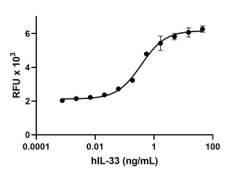- Regulatory Status
- RUO
- Other Names
- IL-1F11

-

Human IL-33 induces the proliferation of mouse D10.G4.1 cells in a dose-dependent manner. The ED50 for this effect is 0.1 to 0.5 ng/mL.
| Cat # | Size | Price | Quantity Check Availability | ||
|---|---|---|---|---|---|
| 581802 | 10 µg | $229.00 | |||
| 581804 | 25 µg | $405.00 | |||
| 581806 | 100 µg | $1055.00 | |||
| 581808 | 500 µg | $2695.00 | |||
IL-33 belongs to the IL-1 family and is closely related in structure to IL-18 and IL-1β. IL-33, IL-1β, and IL-18 are synthesized as biologically inactive precursors and are cleaved by the enzyme caspase-1 to be secreted as active mature forms. IL-33 stimulates target cells by binding to the IL-1R/TLR superfamily member ST2 and, subsequently, activates NF-κB and MAPK pathways via identical signalling events to those observed for IL-1β. In addition, IL-33 is a nuclear factor (NF-HEV) abundantly expressed in high endothelial venules from lymphoid organs that associate with chromatin and exhibit transcriptional regulatory properties.
Product Details
- Source
- Human IL-33, amino acids Ser112-Thr270 (Accession# NM_ 033439) was expressed in E. coli.
- Molecular Mass
- The 159 amino acid recombinant protein has a predicted molecular mass of approximately 18 kD. The DTT-reduced protein migrates at approximately 19 kD and non-reduced protein migrates at approximately 20 kD by SDS-PAGE. The N-terminal amino acid is Serine.
- Purity
- >95%, as determined by Coomassie stained SDS-PAGE.
- Formulation
- 0.22 µm filtered protein solution is in PBS, pH 7.2, 1 mM EDTA, and 2 mM DTT.
- Endotoxin Level
- Less than 0.01 ng per µg cytokine as determined by the LAL method.
- Concentration
- 10 and 25 µg sizes are bottled at 200 µg/mL. 100 µg size and larger sizes are lot-specific and bottled at the concentration indicated on the vial. To obtain lot-specific concentration and expiration, please enter the lot number in our Certificate of Analysis online tool.
- Storage & Handling
- Unopened vial can be stored between 2°C and 8°C for up to 2 weeks, at -20°C for up to six months, or at -70°C or colder until the expiration date. For maximum results, quick spin vial prior to opening. The protein can be aliquoted and stored at -20°C or colder. Stock solutions can also be prepared at 50 - 100 µg/mL in appropriate sterile buffer, carrier protein such as 0.2 - 1% BSA or HSA can be added when preparing the stock solution. Aliquots can be stored between 2°C and 8°C for up to one week and stored at -20°C or colder for up to 3 months. Avoid repeated freeze/thaw cycles.
- Activity
- Human IL-33 induces the proliferation of mouse D10.G4.1 cells in a dose-dependent manner. The ED50 for this effect is 0.1 to 0.5 ng/mL.
- Application
-
Bioassay
- Application Notes
-
BioLegend carrier-free recombinant proteins provided in liquid format are shipped on blue-ice. Our comparison testing data indicates that when handled and stored as recommended, the liquid format has equal or better stability and shelf-life compared to commercially available lyophilized proteins after reconstitution. Our liquid proteins are verified in-house to maintain activity after shipping on blue ice and are backed by our 100% satisfaction guarantee. If you have any concerns, contact us at tech@biolegend.com.
- Product Citations
-
Antigen Details
- Distribution
-
IL-33 mRNA is expressed in a broad range of human tissues, such as heart, small intestine, brain, ovary, testis, pancreas, and colon. Higher IL-33 expression was detected in human keratinocyte, fibroblast, myocyte, and alveolar cells.
- Function
- IL-33 drives production of Th2-associated cytokines from in vitro polarized Th2 cells. In mice, IL-33 injection induced the expression of IL-4, IL-5, and IL-13 and led to severe pathological changes in the lung and the digestive tract. In addition, IL-33 acts as a chemoattractant for Th2 cells, both in vitro and in vivo. TNF-α and IL-1β are activators of IL-33 transcription in fibroblasts and keratinocytes.
- Ligand/Receptor
- IL-33 binds to the IL-1 family receptor T1/ST2 and IL-1RAcP (IL-1 receptor associated protein).
- Bioactivity
- Activity was tested by D10.G4.1 cell proliferation induced by human IL-33. The ED50 is 0.05 to 0.2 ng/ml, corresponding to a specific activity of 5 x 106 to 2 x 107 units/mg.
- Biology Area
- Cell Biology, Immunology, Stem Cells, Transcription Factors
- Molecular Family
- Cytokines/Chemokines
- Antigen References
-
1. Schmitz J, et al. 2005. Immunity 23:479.
2. Barksby HE, et al. 2007. Clin. Exp. Immunol. 149:217.
3. Arend WP, et al. 2008. Immunol. Rev. 223:20.
4. Suzukawa M, et al. 2008. J. Immunol. 181:5981.
5. Moussion C, et al. 2008. PLoS One 3:e3331.
6. Mildner M, et al. 2010. Cardiovasc. Res. 87:769. - Gene ID
- 90865 View all products for this Gene ID
- UniProt
- View information about IL-33 on UniProt.org
